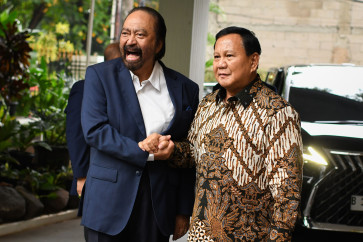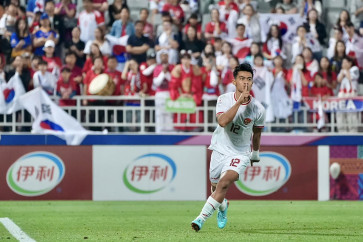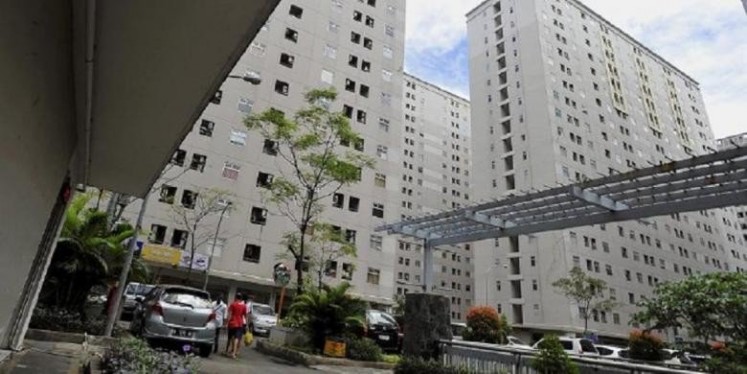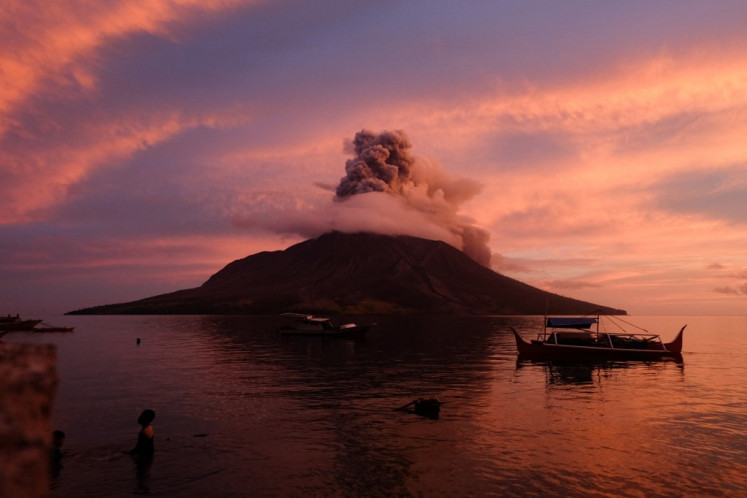Yudhoyono can’t capitalize on nation’s ASEAN boost: Experts
It is only natural to think that after finishing its lauded chairmanship of ASEAN this year, Indonesia would have benefited from reducing the rivalry between China and the US in Southeast Asia while boosting its profile internationally
Change Size

I
t is only natural to think that after finishing its lauded chairmanship of ASEAN this year, Indonesia would have benefited from reducing the rivalry between China and the US in Southeast Asia while boosting its profile internationally.
However, critics say that Indonesian President Susilo Bambang Yudhoyono may not be able to reap such benefits, pointing to his “obedience” to Washington.
Teuku Rezasyah, an executive director of the Indonesia Center of Democracy, Diplomacy and Defense, said that Indonesia had the modalities to help pacify China and the US and sooth ongoing tensions in the South China Sea.
“It is all up to Indonesia now. Only Indonesia can talk to all stakeholders, because it doesn’t have a military pact with any concerned party and doesn’t have any territorial claims in the South China Sea, but it has bilateral interests with all the parties,” he told The Jakarta Post recently.
“It can be [Yudhoyono’s] legacy after he leaves office if there is no arms buildup, no arms proliferation and no military exercises [in the region] during his term.”
With China’s and other claimants’ military buildups in the South China Sea and the future presence of 2,500 US marines in Darwin, Australia, the region’s stability and security are on the brink, analysts agreed.
University of Indonesia security expert Andi Widjajanto said it would be hard for Yudhoyono to rely only on soft power measures, such as dialogues, norms establishment and confidence-building measures, to reduce tensions without resorting to hard power.
Andi also said Yudhoyono was seen as leaning more toward the US than to China up until the Asia-Pacific Economic Cooperation summit in Hawaii in the US, in November.
“Indonesia and China now have the same interest — to prevent the presence of a ‘concert of new economic powers’ that undermine the centrality of ASEAN after the US initiated the TPP [Trans-Pacific Partnership] without taking into account Indonesia’s voice,” he told the Post.
A National Awakening Party (PKB) lawmaker and member of the House of Representatives’ Commission I overseeing foreign affairs, Effendy Choirie, said it would be impossible for Yudhoyono to conduct a “free and active” foreign policy vis-a-vis the China-US rivalry due to his “obedience” to Washington.
Yudhoyono, for example, might well be considered a US spokesman, Choirie said, after he told Indonesians that the US military was in Darwin for “emergency response” exercises.
“He should have said that Indonesia, as a sovereign country, has its own view and that this is our standpoint,” Choirie said.
A source who declined to be named told the Post that US President Barack Obama expressed his displeasure to Yudhoyono when the pair met in Bali last month over Foreign Minister Marty Natalegawa’s initial statement on the US’ planned Australian deployment.
“Obama told [Yudhoyono] that ‘I’m unhappy with your foreign minister’s statement’ — in front of Pak Marty,” the source said.
Marty previously said: “What I would hate to see is for the agreement to provoke a reaction and counter-reaction that would create a vicious cycle of tension and mistrust”.
However, Marty revised his statement over subsequent days, saying the agreement should not be seen as disturbing and that the matter was the business of the US and Australia as part of their bilateral relationship.
Presidential spokesman Teuku Faizasyah, who said he was at the meeting, denied the allegation, while US Embassy press attaché, Troy Pederson, declined to comment.









